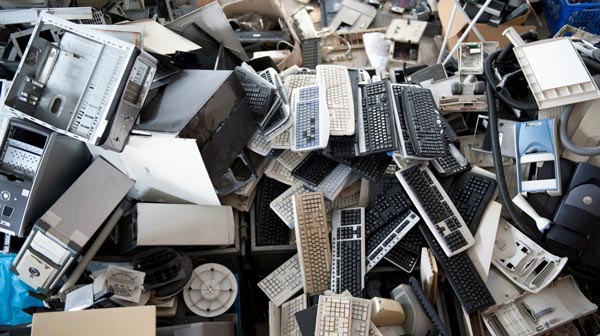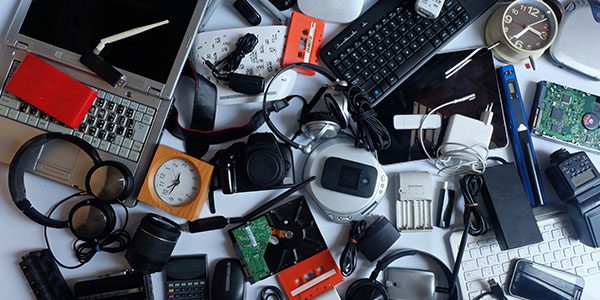Reputable Electronic Devices Recycling Solutions: R2 Certification Establishes the Requirement
Reputable Electronic Devices Recycling Solutions: R2 Certification Establishes the Requirement
Blog Article
Elevate Your E-Waste Administration With R2 Accreditation: an Extensive Overview
In the world of liable electronic waste management, the importance of executing efficient methods can not be overemphasized. As technology rapidly advances, the need for appropriate disposal and recycling of electronic tools has become significantly essential. One key method to elevate e-waste management techniques is by acquiring R2 certification. This certification stands as a hallmark of excellence in the area, indicating adherence to rigorous criteria that ensure ecologically audio methods. By discovering the processes and advantages associated with R2 qualification, a deeper understanding of just how it can revolutionize e-waste administration approaches emerges, losing light on a path in the direction of sustainability and ethical disposal practices.
Significance of E-Waste Administration

When e-waste is not handled correctly, these hazardous substances can leak right into the environment, causing damage to wild animals and potentially going into the food web, positioning threats to human health. Moreover, the improper disposal of e-waste adds to air pollution and greenhouse gas emissions, worsening climate modification and ecological destruction.

Benefits of R2 Accreditation

To start with, R2 accreditation boosts integrity by showcasing an organization's commitment to lasting methods. It ensures customers, partners, and stakeholders that the firm adheres to rigid requirements for e-waste management - r2 certification. This integrity can bring about enhanced depend on and improved connections with customers that prioritize environmental obligation
Secondly, R2 qualification helps reduce dangers related to improper e-waste disposal. By complying with the stringent guidelines stated by the qualification, organizations can reduce the probability of information violations, ecological contamination, and legal repercussions. This positive strategy safeguards the company's credibility and lessens possible responsibilities.
Last but not least, R2 certification demonstrates a commitment to environmental stewardship - r2 certification. By responsibly managing electronic waste through certified processes, organizations contribute to the conservation of resources, reduction of pollution, and promo of a round economic climate. This commitment not only benefits the environment but also aligns with developing consumer expectations for lasting organization techniques
R2 Accreditation Process Overview
Having developed the advantages of R2 qualification in advertising reliability, risk mitigation, and ecological stewardship, it is necessary to currently detail the in-depth process associated with obtaining this certification. The R2 qualification procedure begins with a comprehensive review of the company's operational policies and treatments to make sure compliance with the R2 standard. This first evaluation is essential in identifying any kind of spaces that need to be resolved before continuing better.
Once the company's practices straighten with the R2 common requirements, an independent third-party auditor performs an on-site audit to examine the implementation and performance of these practices. This audit includes a comprehensive testimonial of documentation, interviews with team, and physical evaluations of centers to validate conformity.
Complying with an effective audit, the organization receives a certification choice based upon the auditor's findings. If approved, the company is granted R2 qualification, demonstrating its dedication to responsible e-waste administration. It is necessary to note that preserving R2 qualification requires continuous conformity with the standard's demands and periodic audits to make sure ongoing adherence to finest techniques in e-waste recycling and disposal.
Trick Criteria for R2 Conformity
An important element of accomplishing R2 compliance is guaranteeing that all digital waste (e-waste) processing centers fulfill stringent environmental and security criteria. To follow R2 requirements, organizations need to comply with essential standards that concentrate on liable e-waste management practices. These requirements include applying a recorded ecological, wellness, and safety and security monitoring system, guaranteeing the protected handling of data-containing gadgets, and carrying out thorough downstream due diligence to track the final destination of e-waste products.
In addition, R2 conformity demands the correct screening, repair, and recycling of digital devices to prolong its beneficial life and lessen environmental impact. Facilities seeking R2 accreditation must also prioritize employee wellness and safety and security by providing needed training, individual protective equipment, and a safe functioning setting. Furthermore, preserving comprehensive records of e-waste processing tasks and routinely undergoing audits by approved licensing bodies are crucial elements of demonstrating recurring conformity with R2 standards.
Influences of Lasting E-Waste Practices
The application of sustainable e-waste techniques in accordance with R2 compliance not just makes sure environmental and safety and security requirements are satisfied but additionally substantially impacts the total lifecycle of electronic products. By sticking to R2 standards, digital waste Homepage administration procedures come to be more reliable, minimizing the ecological impact of electronic products. Lasting e-waste techniques promote the appropriate disposal of electronic components, ensuring that harmful materials are taken care of properly and do not wind up click to read polluting the setting.
Furthermore, lasting e-waste techniques can contribute to job development in the recycling and refurbishment markets, cultivating financial development while advertising ecological duty. Overall, the fostering of sustainable e-waste techniques under R2 qualification serves as an essential step towards accomplishing a much more ecologically sustainable electronics industry.
Verdict
To conclude, carrying out appropriate e-waste administration practices is vital for ecological sustainability and resource conservation. R2 accreditation plays an essential role in making sure liable handling and disposal of digital waste. By sticking to the rigid criteria established forth by R2 requirements, organizations can not only decrease their ecological effect but also add to a much Full Report more sustainable future for generations to come.
One key approach to raise e-waste management techniques is by acquiring R2 accreditation. By exploring the advantages and procedures associated with R2 qualification, a deeper understanding of how it can change e-waste administration approaches arises, dropping light on a course in the direction of sustainability and ethical disposal practices.
The R2 qualification process starts with a thorough evaluation of the organization's functional policies and treatments to ensure conformity with the R2 standard. If accepted, the organization is provided R2 accreditation, demonstrating its dedication to responsible e-waste management. In general, the adoption of sustainable e-waste practices under R2 qualification offers as an important action in the direction of achieving a much more ecologically sustainable electronic devices sector.
Report this page